 |
Never in human history have the hopes of so many people for positive change in international relations rested on one person as they do on Barack Obama.
A new 17-nation poll released by the BBC World Service on the eve of his inaugural showed that of more than 17,000 people polled two out of every three respondents, and majorities in 15 of the nations, said they expected US relations with the world to improve under Obama.
"These are really big numbers, and they're on a remarkable trajectory," said Steven Kull, director of the University of Maryland's Program on International Policy Attitudes (PIPA), which helped design and analyse the BBC survey, along with GlobeScan Incorporated, a London-based consultancy firm.
"As a global phenomenon where so many people are looking to one person, this is probably unprecedented," he said.
Nearly three out of every four respondents, which included key countries in western Europe, East Asia, Latin America, west Africa, the Islamic world, as well as Russia, India, and the US itself, said the global financial crisis should be Obama's 'top priority'.
Half of the respondents put 'withdrawing US troops from Iraq' in that category, while 46 per cent named 'addressing climate change' and 43 per cent cited brokering peace between Israel and the Palestinians, a significantly higher proportion than the 29 per cent who thought supporting the Afghan government against the Taliban should be at the top of the new president's agenda.
The survey largely mirrors the steady growth in optimism about an Obama presidency within the United States since his election even as the financial crisis that broke out has become increasingly serious.
In a New York Times/CBS News poll released Sunday, nearly four out of five respondents including nearly three out of five Republicans said they were optimistic about the next four years under Obama, the highest level of optimism about a new president since the question was first asked in 1977 about Jimmy Carter.
No doubt the US polls, as well as BBC's 17-nation survey, reflect the unpopularity of the incumbent, George W Bush, whose eight-year tenure ? especially the Iraq War, the abandonment of the Geneva Conventions for the treatment of prisoners and other global treaties and the aggressive unilateralism of his first term, in particular-brought Washington's global standing to an all-time low.
Much of the goodwill reflected in the BBC poll may be attributable to the contrast between Bush's unilateralism and Obama's repeated emphasis on diplomacy, multilateralism and international law, most recently signaled by his pledge to close down the Guantanamo detention facility and ban the use of torture.
The latest BBC survey, which was carried out in most countries in December, included 1,000 or more respondents in each of the 17 countries: Chile, Mexico, Ghana, Nigeria, Britain, France, Germany, Italy, Spain, Egypt, Turkey, Japan, Indonesia, and China.
The most optimistic views were found in Ghana, where 87 per cent of respondents said US relations with the world would improve under Obama, continental Western Europe (78 per cent), Mexico and Nigeria (74 per cent), Britain
(70 per cent), Chile and China (68 per cent).
Particularly notable, according to Kull, was the sharp rise in optimism in the predominantly Islamic countries compared to last August, from 29 to 58 per cent in Egypt, 46 to 64 per cent in Indonesia, and 11 to 51 per cent in Turkey, whose traditionally pro-US public turned sharply antagonistic with the Iraq invasion.
The only two countries where pluralities, rather than majorities, expressed optimism about Obama's presidency were Japan (48 per cent) and Russia (at 47 per cent, a major rise from 11 per cent in August where U.S.-Russian tensions reached their zenith during the Georgia crisis).
In terms of Obama's priorities, Western Europeans (about two-thirds), with the exception of Germany (49 per cent), rated climate change a top priority. Chileans (68 per cent), Chinese (65 per cent), and Japanese (57 per cent) agreed. By contrast, only 41 per cent of US respondents and a mere 18 per cent of Russians were of the same mind.
In what could bode ill for Obama's pledge to gain more support from NATO for efforts to thwart the Taliban in Afghanistan, US respondents were the most enthusiastic, with 46 per cent calling it a "top priority." While British respondents were close behind at 42 per cent, the notion was somewhat less popular among other NATO allies, ranging from a low of 13 per cent of German respondents to a high of 35 per cent among Spanish respondents.
On dealing with the financial crisis, Chinese respondents showed the greatest concern: 93 per cent called it a "top priority". Germans were next at 83 per cent, while only pluralities in India (47 per cent) and Nigeria (49 per cent) rated placed it in the "top" category.
(IPS)


